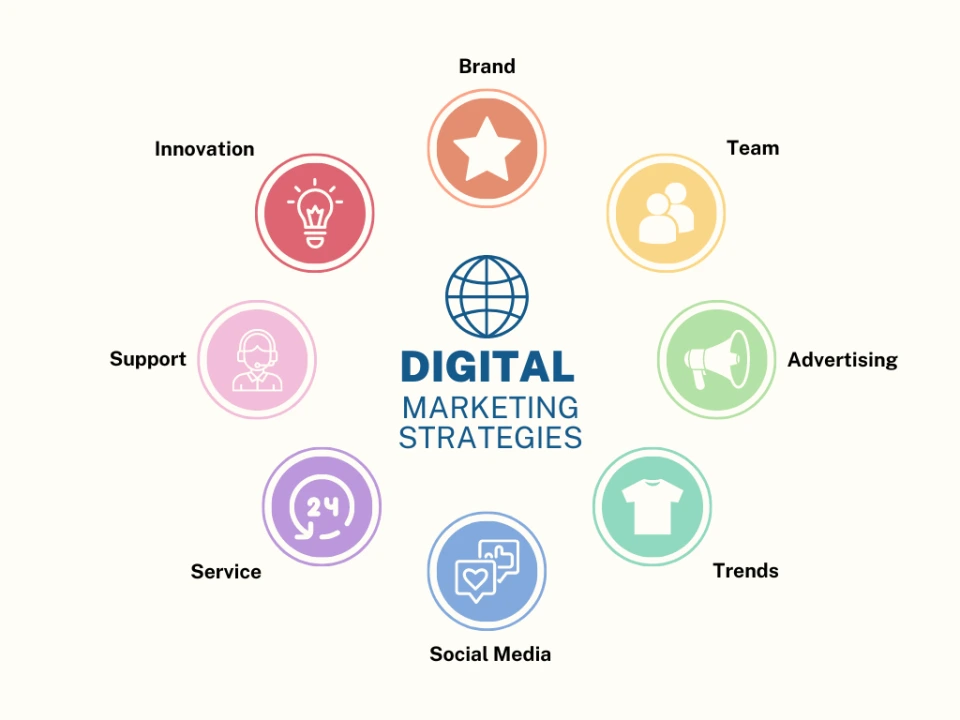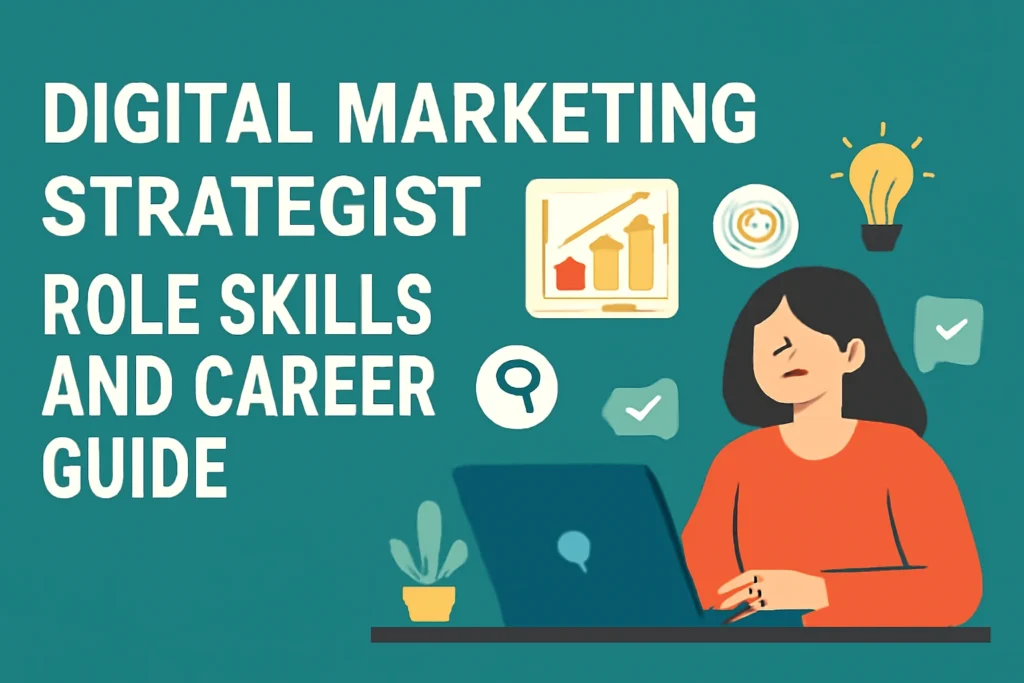Introduction to Digital Marketing Strategist
A digital marketing strategist is a professional who combines data-driven insights with creative marketing strategies to help companies grow in the digital world. Their role has become essential as businesses depend on SEO, content marketing, paid media, and digital advertising to reach the right target audience and achieve higher conversions. By focusing on analytics, optimization, and brand strategy, strategists develop campaigns that strengthen online presence and deliver measurable results. For more resources on digital transformation, visit Tech Radars.
What is the Role of a Digital Marketing Strategist?
A digital marketing strategist plays a central role in shaping effective digital marketing strategies that drive business growth. Their responsibilities include planning campaigns, optimizing SEO for better search rankings, managing PPC and paid media, and ensuring strong social media marketing engagement. By combining content marketing, email marketing, and data analysis, they bridge the gap between brands and their target audience. A strategist develops strategies that deliver measurable conversions while maximizing ROI. With thorough market research and the use of analytics tools, they ensure marketing campaigns remain data-driven, adaptable, and aligned with the company’s long-term online marketing goals.

Detailed Job Description of a Digital Marketing Strategist
A digital marketing strategist takes on a multifaceted role, blending strategic planning with execution and optimization to ensure successful digital marketing campaigns. Their work requires a balance of creativity, data analysis, and leadership to deliver strategies that align with business goals and drive measurable conversions.
Strategy Development – Data-Driven Planning, Market Research, Funnel Creation
Strategists conduct thorough market research, analyze customer behavior, and use data-driven insights to design an effective digital marketing strategy. They map customer funnels, identify opportunities, and align brand strategy with the target audience to maximize impact.
Execution of Campaigns – Content Marketing, Social Media Ads, PPC
A strategist develops and manages integrated campaigns across content marketing, social media advertising, SEO, PPC, and various digital marketing tools. Their goal is to optimize every channel, ensuring consistent messaging and high-performing campaigns that reach new customers.
Monitoring & Optimization – Analytics, KPIs, A/B Testing, Conversions
Digital marketing strategists must continuously track KPIs and conversion metrics using analytics tools. They run A/B tests, evaluate performance, and optimize campaigns to improve ROI, ensuring strategies that deliver results.
Collaboration – Working with Content Writers, Designers, and Project Managers
Collaboration is essential in the strategist role. They coordinate with content writers, designers, and the wider marketing team to ensure campaigns are cohesive, brand-focused, and executed on time.
| Responsibility | Description | Example Tools |
|---|---|---|
| SEO | Optimize site visibility | Google Search Console, Ahrefs |
| Paid Media | Manage PPC campaigns | Google Ads, Facebook Ads |
| Analytics | Track performance | Google Analytics, SEMrush |
| Content Strategy | Plan & publish content | WordPress, HubSpot |
| Social Media | Build brand presence | LinkedIn, Instagram, X (Twitter) |
Essential Skills Every Digital Marketing Strategist Must Have
A digital marketing strategist needs a diverse skill set that combines analytical thinking, technical expertise, and creative problem-solving. These skills enable strategists to design effective marketing strategies, measure performance, and adapt to the fast-changing digital world.

Analytical Skills – Interpreting Data, Measuring ROI
Strategists must analyze data from marketing campaigns, track conversions, and measure ROI using analytics tools. This ensures strategies remain data-driven and optimized for growth.
Technical Skills – SEO, SEM, PPC, Marketing Automation
Proficiency in SEO, search engine marketing (SEM), PPC, and marketing tools allows a strategist to improve search rankings, manage ad campaigns, and streamline marketing efforts.
Communication Skills – Presenting Strategies, Client Collaboration
Clear communication is vital when explaining strategies to clients or working with the marketing team. Strong collaboration helps align goals across projects.
Creativity & Adaptability – Innovative Content Ideas, Trend Adoption
Digital marketers must stay ahead of the competition by creating engaging content, adopting new marketing trends, and ensuring campaigns resonate with the target audience, which is crucial for a successful digital marketing strategy.
Top 5 In-Demand Skills for 2025
- Search Engine Optimization (SEO)
- Social Media Strategy
- Data Analytics & AI-driven tools
- Paid Media Management (PPC, SEM)
- Content Marketing & Storytelling
Career Growth and Salary Insights
A career as a digital marketing strategist A career in digital marketing offers strong growth potential, with salaries varying across regions, especially for those proficient in digital advertising. In the US, professionals in this role often earn between $65,000 and $95,000 annually, while in the UK salaries range from £40,000 to £70,000, reflecting the growing demand for digital marketing skills. In Asia, the demand is rising quickly, offering competitive packages as companies expand their online presence. Career paths typically begin with a junior strategist role, progressing to senior strategist, and eventually marketing director or team leader. Case studies like this Thrive Market Review The responsibilities of a digital analyst show how strategists adapt campaigns to connect with niche audiences.
How to Become a Digital Marketing Strategist
Educational Background
Most digital marketing strategists start with a degree in marketing, business, or communication, which provides a strong foundation in consumer behavior and market dynamics, essential for a successful digital marketing career.
Certifications
Earning certifications like Google Ads, HubSpot Inbound Marketing, or Facebook Blueprint boosts credibility and showcases expertise in specific platforms.
Hands-on Experience
Practical exposure through internships, freelancing, or agency roles helps build real-world skills in SEO, PPC, content marketing, and analytics.
Staying Ahead
Digital marketing evolves rapidly, so staying updated with online digital marketing trends is vital for success. Staying informed about market trends, AI-driven tools, and new platforms is essential for a successful digital marketing career. is key to long-term success.
Digital Marketing Courses and Training Content
Online certifications have made it easier than ever to learn digital marketing from anywhere in the world. These courses typically cover SEO, SEM, PPCDigital marketing skills, content creation, blogging, analytics, and optimization strategies are all essential components in the field. Many also include training in social media management and paid advertisingDigital marketing certification programs ensure learners gain a complete understanding of modern marketing practices.
Benefits of Taking a Course in digital marketing certification include gaining essential knowledge and skills for a successful career.
- Master advanced tools like Google Analytics and SEMrush.
- Build a strong portfolio to showcase skills.
- Increase employability and salary potential.
- Stay updated with industry best practices and trends.
Future of Digital Marketing Strategists
The future of digital marketing strategists lies in harnessing AI and automation to streamline campaign management and improve targeting. With personalization becoming central to customer journeys, strategists will design experiences tailored to individual preferences and behaviors. We’re also seeing greater integration of traditional and digital marketing, where offline campaigns connect seamlessly with online strategies. At the same time, rising concerns over traditional marketing approaches show how strategists adapt campaigns to connect with niche audiences. data privacy and ethical practices mean strategists must balance innovation with compliance, ensuring trust and transparency while driving business growth in an evolving digital ecosystem.
FAQs About Digital Marketing Strategists
Q1: What exactly does a digital marketing strategist do?
They plan, execute, and optimize online campaigns to increase brand visibility and drive conversions.
Q2: How is a strategist different from a digital marketer?
A strategist focuses on planning and overall vision, while digital marketers handle the execution of specific campaigns.
Q3: Do I need coding skills to become a strategist?
Basic knowledge of HTML and CSS can be useful, but it’s not mandatory for success.
Q4: Which industries hire digital marketing strategists the most?
E-commerce, SaaS, healthcare, finance, and tech companies frequently hire strategists.
Q5: Can a beginner build a career in digital marketing strategy?
Yes, with training, certifications, and hands-on practice, beginners can enter and grow in this field.
Conclusion – Why Pursue a Career as a Digital Marketing Strategist
Digital marketing strategists are the driving force behind business growth in today’s competitive online landscape. By combining analytical skills, creativity, and technical expertise, they help brands connect with the right audience and maximize ROI. With continuous learning and adaptability, strategists stay ahead of trends and ensure long-term success for organizations. For those passionate about marketing, technology, and strategy, this career offers endless opportunities, high demand, and rewarding growth. If you’re considering a future in digital marketing, stepping into the role of a strategist can be a powerful and fulfilling choice.


